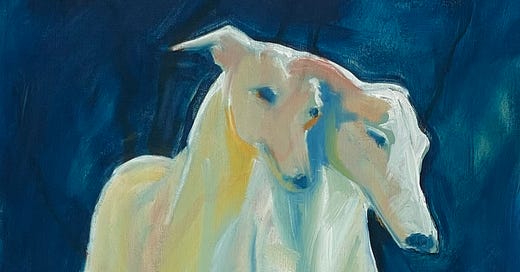It seems a great disadvantage to me that painting is two dimensional. But that’s the thing; it fits on the wall. Of course I could work with sculpture. Or clay or glass, like I once did. But I have the perverse desire to bend the medium from two to three dimensions. Perhaps all painters do. It is as if I were overcoming the laws of physics. There is, after all, a god-like aspect to being an artist. We form the world that we want, we say what we want as if we are indeed beginning at the very beginning, signified by unmarked white.
When I see the canvas as a blank, two dimensional surface, I feel dismayed. Perhaps that is part of why I enjoy painting over older paintings so much; I am not dominated by the feeling of a flat plane-rather I feel free to modify the surface, and sculpt with my paint.
I want to get movement onto my canvas. But I don’t think of it that way. I think I need to get movement into my canvas. I quickly involve myself in the dream that the canvas is multidimensional, and I, as the artist, am swimming in it’s folds. That is if I think at all. Normally my right brain takes over, and its not exactly thought that is happening. It is easier to sustain the illusion that I am moving about in space when I paint over something. Partly because it doesn’t matter much-I’ve already destroyed the whiteness of the canvas once, so everything I do now can only be an improvement! Plus the under layers add a lot of texture to my new painting. Or so I hope. It is a fantasy, and moving shapes around by the facility of color allows me to enjoy the dream.
The dogs I painted above are leaning against each other, the way some sighthounds do, and I hope you can feel their long toes moving in their plane; the quivering and dance they are engaged in as they circle one another endlessly. I find that I am fond of slightly inexact shapes. There is more life in the swath of color that is not quite right for an ambling limb than in the overly careful line of exactitude.
I spent most of Saturday
trying to decide what to paint. I have noticed that not planning is a problem. Although I like to follow the adventure of what the paint suggests, I notice that when I do so the painting lacks composition and power. It is a shift for me to paint with intention. I enjoy just following my inclination with the brush, but since noticing that I paint over so many of my paintings that started out that way, I’ve decided to use my left brain for a while.
It remains the case that part of a good painting, my own I mean, seems to be accident. As I feel into the image, the element of accident appears in a brushstroke that carries the inner sense of the image but is in no way exact. I like these moments the best. Once, many years ago, I quickly sketched my boyfriend’s face. Just 5 or 6 quick lines, but it was enough to render his face and the expression I most associated with him. It showed a fine, uneven smile, slightly sardonic and tender I suppose, and it felt like magic to me. An outside observer might have said I drew the picture, but it didn’t seem that way to me at all. Instead, it was an accidental configuration-as if I had tossed a pile of driftwood onto the sand and it ended up in a recognizable pattern.
I suppose, in many ways, I am still seeking that experience: the magic of appearing, the absence of agency, the story that unfolds directly from my mind with scarcely the mediation of reflection, and yet completely illuminated. The line is the smile is the moment is my brush, is me. It is a spontaneous moment, this surprise, and I seem to have become addicted to it. After all, isn’t it all a surprise? And isn’t our sense of agency only after the fact?
Namaste,
Leslie






So much to love here.
I've been thinking about the mystery of how we claim ourselves in arrears and project ourselves into an owned future, whereas the truth is that our connection with some earlier version of "myself" is as happenstance as any claim of identity or knowing of any person. At certain moments we selectively remember some shape of our thoughts and expectations. Likewise, the imagining that we are moving toward some definable future version of ourselves— more accomplished and agreeable than our present sense of self— this, too, is a mirage. It seems to me that when we think we have arrived at a point of flexion, we are no longer the one who started out those years ago. We are all prodigal sons, or Maiden, Mother, Crone. As I enter my "crone" years, I am not the same person that I was. It's not a private failing. I don't believe anyone truly can claim their past or future, despite assertions to the contrary. Maybe a thing is only believable as long as one doesn't pay attention. As long as one doesn't listen carefully. Maybe the only thread that ties it all together is an insistence on suffering, an adherence to the tutelage and transmutative power of the Question we incarnate.